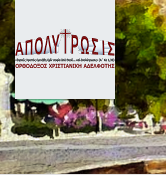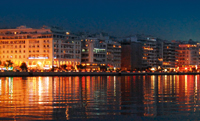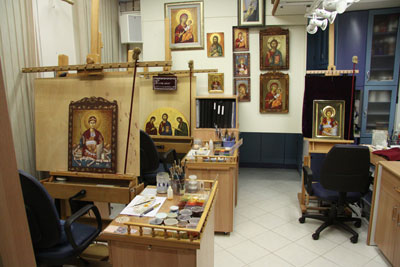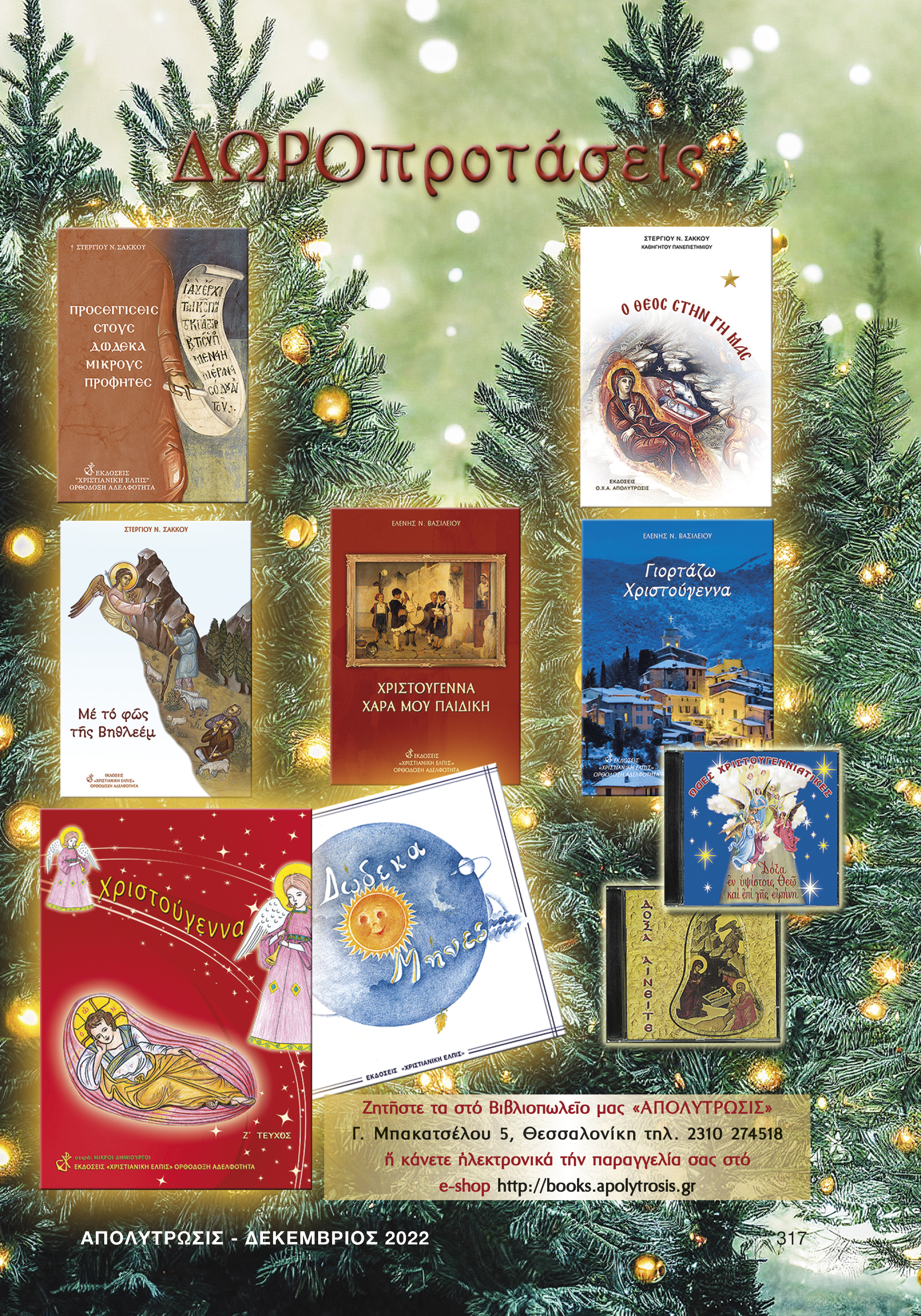 ΑΠΟΛΥΤΡΩΣΙΣ
ΧΡΙΣΤΙΑΝΙΚΗ ΟΡΘΟΔΟΞΗ ΑΔΕΛΦΟΤΗΣ
ΑΠΟΛΥΤΡΩΣΙΣ
ΧΡΙΣΤΙΑΝΙΚΗ ΟΡΘΟΔΟΞΗ ΑΔΕΛΦΟΤΗΣ
Super User
THE FOUNDATION AND BASIS OF PROGRESS
Translation from the article:
Στεργίου Ν. Σάκκου, Τό θεμέλιο τῆς προόδου, περιοδ. "Ἀπολύτρωσις" 59 (2004) 28-30.
(Stergios N. Sakkos, University Profssor [Read CV])
 It is the law of nature, which human ingenuity has made a law of mechanics: The height to which the top can reach, depends on the stability of the base. The roots go deep into the soil, so that the tree can grow and bear fruit. The builder digs deep into the ground in order to raise the building. How could the building possibly stand without a foundation? Similarly in the spiritual life, the inner holiness results in growth and progress. For this reason, the Holy Bible persistently emphasizes the necessity of inner purity, and the saints of the Church had as a goal of their lives to "dig inside".
It is the law of nature, which human ingenuity has made a law of mechanics: The height to which the top can reach, depends on the stability of the base. The roots go deep into the soil, so that the tree can grow and bear fruit. The builder digs deep into the ground in order to raise the building. How could the building possibly stand without a foundation? Similarly in the spiritual life, the inner holiness results in growth and progress. For this reason, the Holy Bible persistently emphasizes the necessity of inner purity, and the saints of the Church had as a goal of their lives to "dig inside".
In our times, seeming good externally and impressing others are priorities. A lot of attention and prayer is needed, so that the Christian does not lose the sailing course, does not "drift away", as the apostle Paul writes (Heb 2:1), and does not deviate from the right path. It is precisely in this need that our holy Church comes to help with its entire program. The Church exhorts and leads its children to a renewal of the inner man, to reach a spiritual "depth".
"Be on your guard", the apostle Peter exhorts the "beloved brothers" of his time but also of every era "so that you may not be carried away by the error of the lawless and fall from your own steadfastness, but grow in the grace and knowledge of our Lord and Savior Jesus Christ" (2 Pet 3:17-18). With the Baptism and the Anointing, we entered the area of "steadfastness", we were placed as "living stones" in the unshakeable foundation of the Church, which is Christ himself, and monopolizes salvation on earth. Our steady course within the Church ensures and guarantees our growth. It is our duty not to be left behind, fruitless; not to lose our steadfastness.
Undoubtedly, the ship of the Church is sailing safely to its heavenly destination. It will surely reach the serene port no matter how many storms it encounters. Our only anxiety is whether we, its members, will be on board, in the holy ark of the one Holy Catholic and Apostolic Church, the Orthodox Church until the end. And this anxiety is well-founded and justified, because serious dangers and powerful enemies threaten to us take us away from the Church, to snatch us from her arms, to uproot us from her vineyard! Some of them come from the outside; they are declared enemies of the Church while others spring from its bowels. Some of them are well-known, overt and powerful and others are insidious and camouflaged. How, then, will we remain steadfast, stable and growing in the ark of salvation? The centuries-long history of faith highlights the proven means that every believer must use for their steadfastness:
♦ The name of the Lord. “Jesus’ name scourges the enemies. There is truly no stronger weapon on earth nor in heaven”, stresses St. John of the “Kλίμαξ”. The simple prayer, "Lord Jesus Christ, have mercy on me", is the umbrella, the lightning rod that neutralizes the passions. With its help, we are immersed deeper in grace and stabilized in the Church, on the ground of our salvation.
♦ The memory of death grounds us in reality as it reminds us of our transience and perishability. In this way it kindles the desire for the incorruptibility of eternity and the perfect reality of heaven. "For our citizenship is in heaven" (Phil 3:20), emphasizes the apostle Paul. There, in heaven, our desires come true and our destiny is fulfilled. This certainty gives meaning and direction to our life here.
♦ Waiting for the Lord. "For you I keep myself chaste, and holding my shining lamps I run to meet You, my Spouse", chanted the Christians of the first centuries, as the saint and martyr Methodius, Bishop of Olympus reports. They waited daily for the Lord, and this feeling made their love warm, their faith alive, their hope immovable,
their repentance constant and overwhelming, their lives bright. And if the Second Coming of Christ does not take place in our days, who can assure us that death won’t come sooner than expected?
♦ Divine worship with the experience of prayer and the holy sacraments keeps open the communication with the reality of heaven and sanctifies our being.
♦ The word of God, the lives of saints and martyrs, the writings of the fathers of our Church are also proven helpers in the struggle of spiritual life.
♦ The example of the holy members of the Church is still a great support. There are still today, thank God, the good examples around us. Let them be our inspiration.
"If you have seen your brother, you have seen God," say the saints. The salvation of each one of us is a personal but also a collective affair, in the sense that within the body of the Church we walk along with our brothers. I cannot remain indifferent to their own salvation. I must stand as a brother in the need of the others. To feel them as brothers and to run alongside them. Here is the diamond foundation for the true progress of our world. This is the foundation for true spiritual fruitfulness.
Nowadays the enemies of the Church are organized against it, seeking to eradicate piety and wither faith. Every day we witness the relentless and merciless attack against faith. Don't let this alienate us or scare us! It should only remind us of our duty as members of Christ’s Church. Not only the saints who have passed from this world but also the faithful, who today are struggling and with the grace of God remain firm and rooted in the Orthodox faith, call us to stay alert. Let's stay steady and keep growing. In this way, our brothers stay steady and grow along with us, too. This is how the kingdom of God is spreading on Earth and our society prospers and becomes sweet.
Copyright © 2021 by Orthodox Christian Association «ΧΡΙΣΤΙΑΝΙΚΗ ΕΛΠΙΣ» ΟΡΘΟΔΟΞΗ ΑΔΕΛΦΟΤΗΤΑ. Used by permission. All rights reserved.
ABRAHAM - THE SACRIFICE OF ISAAC
Translation from the Book
Ὁ Θεός στήν Παλαιά Διαθήκη, Βοήθημα Κατωτέρου Κατηχητικοῦ Α΄,
ἐκδ. «Χριστιανική Ἐλπίς» Ὀρθόδοξη Ἀδελφότητα, Θεσσαλονίκη 2015, σσ. 48-52
After the event of the language confusion, that happened when people were building the Tower of Babel, they were spread around the globe. Unfortunately, they forgot about true God on all those new places, they chose to live. They started worshiping the sun, the rivers, some animals or even some small statues they created, also known as idols. All of them though? No. Among all the pagans there was somebody who kept his faith in true God; Abram, like Noah who had lived earlier. Abram had such great faith in God, that God made him a patriarch, which means he was the father and the leader of a whole nation. Also, he was honoured to become the forefather, that is, the ancestor of our Lord Jesus Christ.
Abram lived at Mesopotamia, in town Harran. The area was called Mesopotamia because it was located in between two big rivers, Tigris and Euphrates. It was a very fertile land in the continent of Asia. So, this is where Abram inhabited along with his wife Sarah. He was a rich man owning lots of herds and lots of servants. He was very generous, and he would share his goods with people in need. Also, he welcomed any long-distance travellers he met. All these could use his home as a place to rest. He was a philanthropist and a hospitable man. Yet, the most important thing about Abraham was his great faith. Although, he lived among pagans, he believed and loved wholeheartedly the true God. And he proved his faith with actions.
-Abram! God’s voice reached him one day. Leave this land, your relatives and your family home and come to live at a place I’ll show you. Do you think that was a simple task God was asking him to do? He was ordered to leave behind his home and his loved ones and direct to the unknown! He had to pack all his belongings up and along with his servants and animals to walk day and night for days, maybe months without even knowing the destination! Was that easy? Of course not! But it was God requesting it. And since it was him, Abram would obey. He was ready, whatever the difficulties, to sacrifice everything for God! This shows his great faith.
God, also, gave him a great promise:
“From you I will create a great nation and all the earth’s tribes will be blessed”.
God repeated this promise to him many times:
“Your descendants will be many, countless, like the stars in the sky!”
God changed his name as well: From Abram to Abraham, which means “the father of many nations”.
Yet, time was passing year by year. Abraham got old. His wife, Sarah was sterile, meaning she could not give birth to a child. And then all these promises from God that his descendants would be countless, how could they turn real when they were childless? So, had Abraham stopped believing in God’s promises? Nothing, could have shaken his vast faith in God. If God said it, it will be done! So, what if it seems impossible? Nothing is impossible to God!
God indeed led Abraham to the rich land of Canaan. And in this place God gifted him with many goods, but also gave him an unbelievable happiness: a child, a graceful son. He named the boy “Isaac”, which means “laughter, joy”. Abraham was truly happy! And he felt even greater happiness since God had promised him that from his generation lots of nations would grow and God’s blessing would come to the earth.
One day, however, God said to him: “Abraham! Take your beloved son, Isaac, who you love so much and go to the mountain where I will show you. There you will offer him to me as sacrifice!”
What? Did he hear well? To offer Isaac as a sacrifice, his one and only son and be-loved child? God’s order was like a stab in Abraham’s heart. Such a sacrifice sur-passed his powers. And then, what about the promises that God had given him, how could they be realized?
And yet, Abraham the next day, early in the morning prepared the wood for the sacrifice and loaded it on the donkey. He took with him two servants and Isaac, and he set out for the mountain that God had told him to go.
Will he sacrifice, then, Isaac? But God had asked him to! Abraham was ready, however difficult it might be, to do even the greatest sacrifice for God! This shows the size of his faith.
Abraham fully trusting in God, he set off along with his beloved son, Isaac, to of-fer God a sacrifice high on the mountain. When the place of sacrifice was seen from afar, he unloaded the donkey and gave the wood to the unsuspecting Isaac to carry. Himself took the knife in his hands and what was needed for the fire and leaving be-hind the servants, father and son started going up the mountain. As they were walk-ing, Isaac asked:
“Father, here is the fire and the wood for the sacrifice! But where is the sheep we are going to sacrifice?”
“God will take care of the sheep for sacrifice, my child”, answered the faithful Abraham.
Without exchanging any more words, they continued to move on, until they reached the top of the mountain.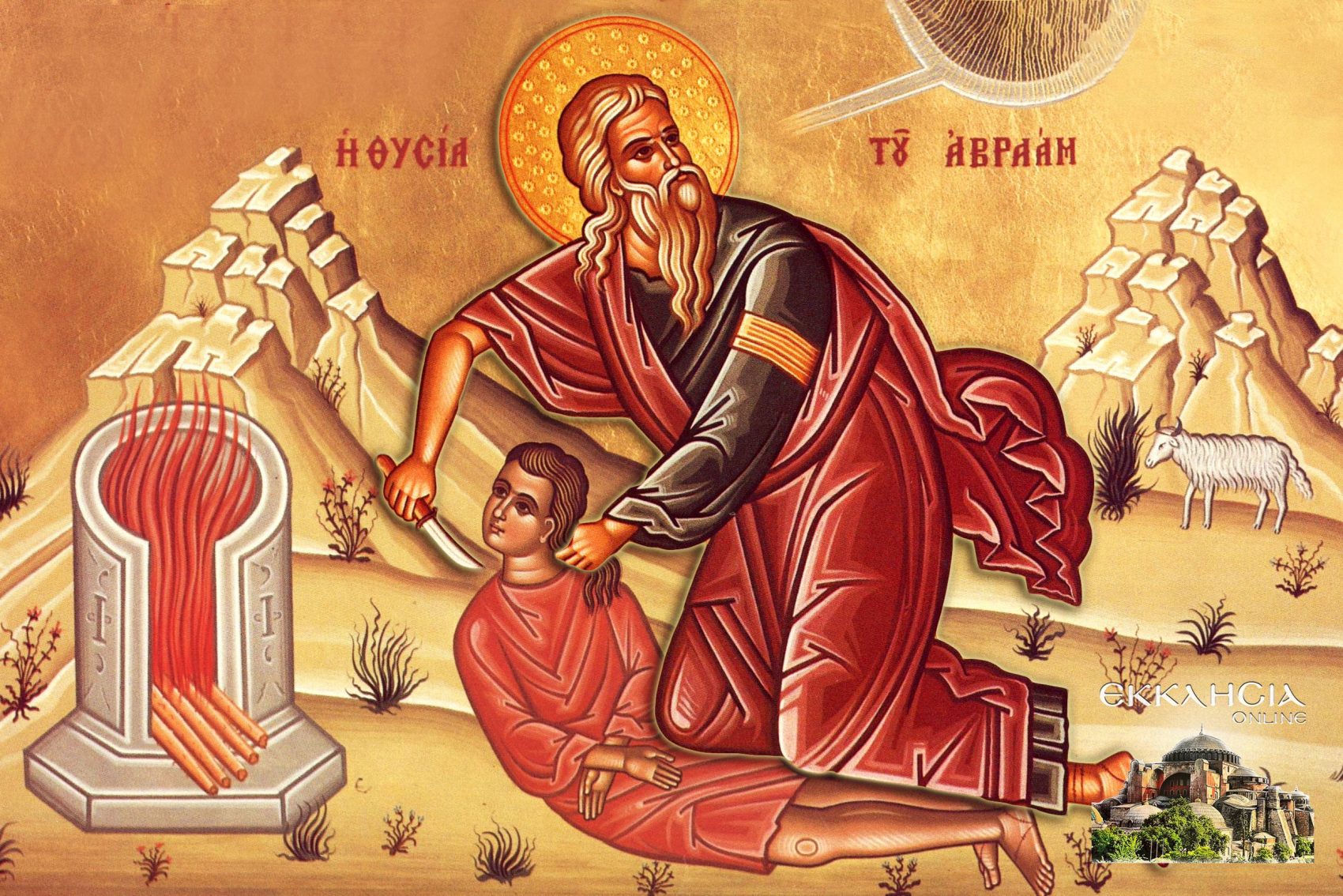 There, Abraham set up an altar with stones, he put the wood on top of it, tied up Isaac and he placed him on the woods of the altar. He stretched out his hand to reach the knife for the sacrifice but on the last moment he heard a voice from the heavens, the voice of an angel: "Abraham! Do not put your hand upon the child and do not harm him. God has seen how much you respect him, since for his sake you did not feel sorry sacrificing even your beloved child."
There, Abraham set up an altar with stones, he put the wood on top of it, tied up Isaac and he placed him on the woods of the altar. He stretched out his hand to reach the knife for the sacrifice but on the last moment he heard a voice from the heavens, the voice of an angel: "Abraham! Do not put your hand upon the child and do not harm him. God has seen how much you respect him, since for his sake you did not feel sorry sacrificing even your beloved child."
Abraham then lifted his eyes and saw a ram having his horns caught in a plant called Savek!
He took the ram and offered it as a sacrifice to God, full of gratitude for his love! Then God for one more time repeated to Abraham his great promise: "Your de-scendants will be countless, like the stars in the sky and like the sand of the sea. And from your generation shall come the blessing to the nations."
Meaning that from Abraham’s generation Christ would be born, the savior of the world.
Our Sacrifices for God
What did God see in Abraham and blessed him in such abundance? His great faith! And how did Abraham show his faith in God? By his obedience to the will of God; by doing big sacrifices in order to be obedient to God’s will.
What about us? How much do we believe in God? How can we count the weight of our faith in him? By counting the sacrifices, we make for God.
What sacrifices, do you think, can children make for God?
♦ They can sacrifice their sleep, for going to church on a Sunday morning.
♦ They can sacrifice doing activities with their friends, for Sunday school.
♦ They can sacrifice enjoying some delicious food, for fasting periods or when they are going to receive the Holy Communion.
♦ They can sacrifice their free time, for visiting someone who is sick or relatives or neighbors who live alone and seek some company.
♦ They can also sacrifice their pocket money for charity, giving their savings to the special box for the poor that there is in every Orthodox church.
All these sacrifices can measure our faith. And if sometimes it seems hard to make such sacrifices, we can only think of the huge sacrifice that Christ made for us. We should think this: "Jesus Christ sacrificed himself on the cross for me. In front of his great sacrifice, whatever sacrifice of mine is tiny!".
Copyright © 2021 by Orthodox Christian Association «ΧΡΙΣΤΙΑΝΙΚΗ ΕΛΠΙΣ» ΟΡΘΟΔΟΞΗ ΑΔΕΛΦΟΤΗΤΑ. All rights reserved.
THE TOWER OF BABEL
Translation from the Book
Ὁ Θεός στήν Παλαιά Διαθήκη, Βοήθημα Κατωτέρου Κατηχητικοῦ Α΄,
ἐκδ. «Χριστιανική Ἐλπίς» Ὀρθόδοξη Ἀδελφότητα, Θεσσαλονίκη 2015, σσ. 30-35
It is common nowadays that people speak more than one language. Learning one or more foreign languages is encouraged, because it assists communication among people who come from different countries. However, this was not always necessary. All people once spoke the same language and lived in the same place. This information is given in the Holy Scripture and it is supported by linguists. So, when did people start speaking different languages? The answer can be found in an incident described in the Old Testament.
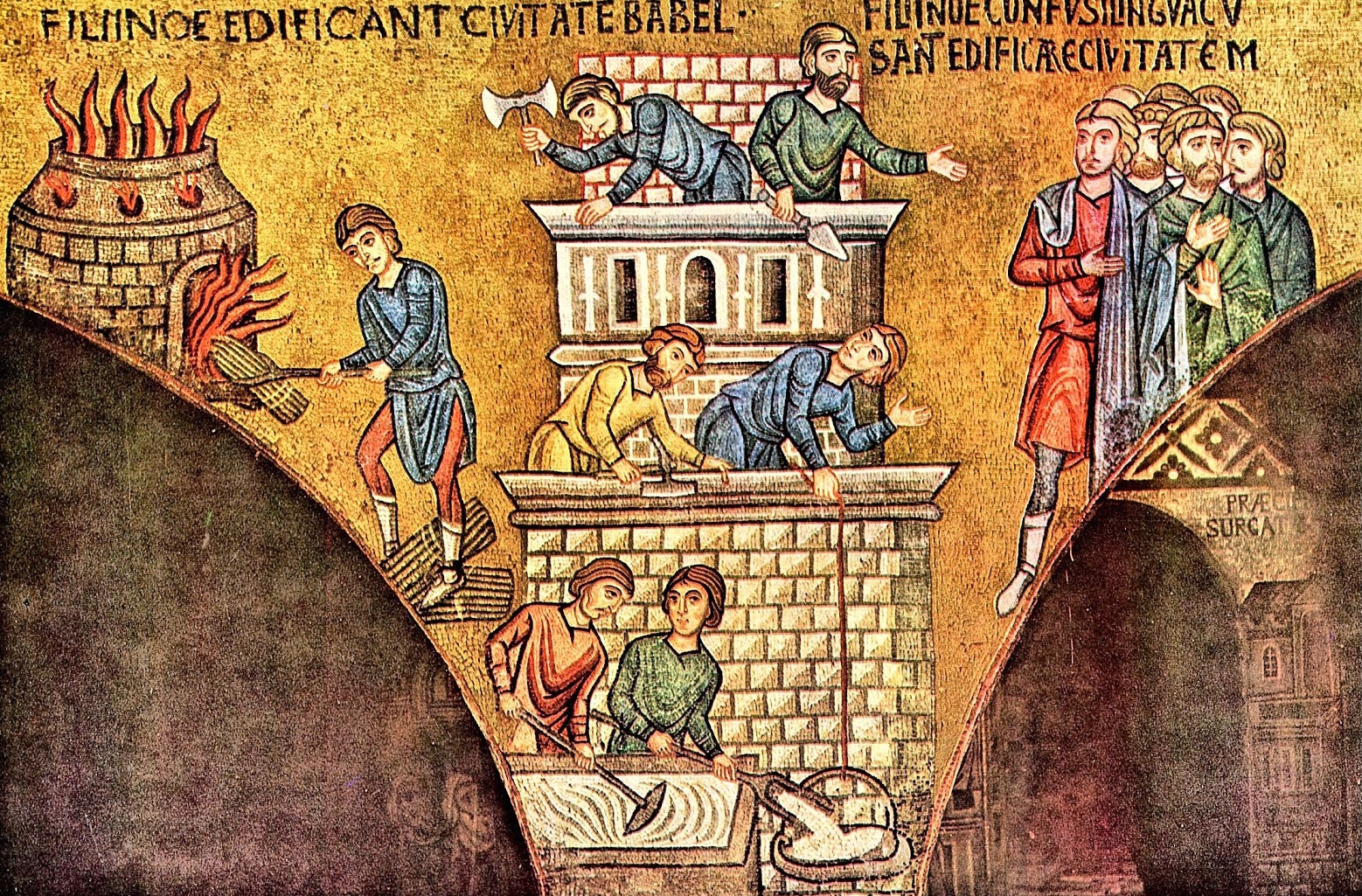 Noah’s descendants, blessed by God, were increasing significantly. Since they were too many to live in the same place, they headed southwest and settled in Senaar. But as time passed by, this land too wasn’t enough to accommodate them. So, they realized they had to disperse over different places. Before leaving they made an agreement to build a city with a tower which would make them famous.
Noah’s descendants, blessed by God, were increasing significantly. Since they were too many to live in the same place, they headed southwest and settled in Senaar. But as time passed by, this land too wasn’t enough to accommodate them. So, they realized they had to disperse over different places. Before leaving they made an agreement to build a city with a tower which would make them famous.
-Let’s build together a city with a tower. The tower should be so high that it will reach the sky! Then our name will be known and remembered by future generations.
These words veiled pride. They thought themselves capable of building such a huge and admirable building on their own, without God’s help. How deluded were they! They never managed to finish their work.
At first everything was going according to plan, because they worked eagerly and the tower became higher and higher. But then, all of a sudden, something strange happened; they couldn’t communicate or cooperate. Everyone started shouting and arguing… They spoke different languages! The construction could no longer be continued.
As it is written in the Old Testament, God saw the city and the tower which was being built. He saw deeper, the pride in the hearts of the constructors. For that reason, he confused their language and threw a spanner in the works. Those proud people never succeeded in finishing the construction of the tower. Disappointed, they left it semi-finished. The tower was known to future generations by the name Babel which means “confusion”.
Noah’s descendants went separate ways. Ham’s descendants went to Africa, Japheth’s offspring to Europe and Shem’s to Asia. People gradually obtained distinct characteristics and color because of the climate differences in their habitats. In that way different races were formed.
In the course of time people forgot that they came from the same family, they once spoke the same language and they worshipped the same God. The difference of their appearance caused them to get estranged. Even worse, they started hating each other and fighting wars.
The Woe of Pride
The proud craftsmen in Senaar never finished their tower and ended up bitterly scattered and alienated. Nevertheless, they weren’t the first to be seized by pride. Pride is rooted in Satan. In the beginning Satan was an important and outstanding angel of God. His name was Lucifer which means “really bright”. However, he prided himself and thought he could take God’s place. So, the bright angel became a dark demon and ended up in hell.
Adam and Eve, the first man and woman, believed Satan’s lie and thought that they could become gods. So, they ate the forbidden fruit and as a result they lost heaven and their life became miserable. This megalomania and pride have often been human traits ever since.
Throughout history a lot of proud people appeared. They scorned their fellow human beings as inferiors. They became cruel and brought great disasters on people’s lives. Take Hitler for example. A single proud and cruel man, who ruled Germany, caused World War II. He thought he was powerful and wished to rule the whole world without respecting God and his will. The result was a failed plan, millions of dead people and destroyed civilizations. These are the woes of pride.
We often pride ourselves on our job, our appearance, our talents, our knowledge, our ancestors, or our achievements. We forget that everything good we have is owed to God. Some may think
-Is it bad that I’m happy when I succeed in something or when I earn something?
-Definitely not. But it’s one thing to feel happy and another to feel proud.
Pride makes us consider ourselves overly great and we start pursuing things out of our league, without considering God’s will. Then we are possessed by megalomania, like the people who wanted to build the tower of Babel. The result is to suffer from the consequences of our failure and mistakes.
Pride also makes us think that we are more important than others. The feeling of superiority urges us to behave disparagingly towards others, as if we are unique in the world.
Pride hardens our heart. A proud person is unable to feel affinity for others, be tolerant to others’ mistakes, show sympathy for others’ misfortunes. Proud people are full of themselves, having no interest in others.
A proud person becomes disagreeable in people’s eyes but also in God’s eyes. “Every one that is proud in heart is an abomination to the Lord”. (Prov 16:5). God looks away from a proud person and takes away His blessing. “But this is the one to whom I will look: he who is humble and contrite in spirit and trembles at my word” (Is 66:2). A humble person attracts God’s eye and His grace.
We need to demolish the tower of pride and build the ladder of humility in its place. This ladder leads to the heavens!
First step: I don’t brag about my talents and belongings. Everything good I have got, isn’t mine but God’s. I cannot brag about what isn’t mine. So, I don’t flaunt my belongings or my achievements. Ι am not conceited but I live and behave with simplicity.
Second step: I don’t underestimate anyone or talk dismissively. I accept people as they are. I behave graciously. God bestows ηis gifts on everybody. It is an illusion to see only my talents and think that am superior to others.
Third step: I show everyone my love. When I love I can’t insult, I can’t be cruel. A humble person loves everybody and that love is the supreme virtue.
Here is the ladder of humility! The person who learns how to climb it, he gets closer to God.
Let’s pray to God to give us not only commodities, talents and successes but to give the most important of all; humility and modesty.
Pride is dreadful
It drives us away from God
Humility is wonderful
It elevates our soul to God
Copyright © 2021 by Orthodox Christian Association «ΧΡΙΣΤΙΑΝΙΚΗ ΕΛΠΙΣ» ΟΡΘΟΔΟΞΗ ΑΔΕΛΦΟΤΗΤΑ. All rights reserved.
Προσφυγικό Λειμωνάριο
Αυθεντικές Ιστορίες Προσφύγων Β΄
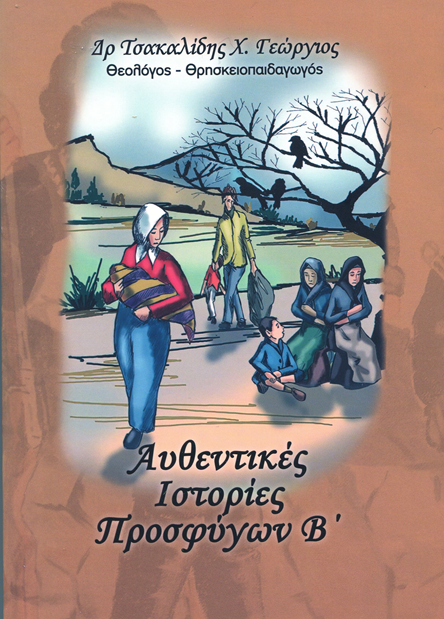 Κυκλοφόρησε πολύ πρόσφατα, με αφορμή τα 100 χρόνια από τη Μικρασιατική Καταστροφή, ο δεύτερος τόμος «Αυθεντικές Ιστορίες Προσφύγων», που συνέγραψε ο δρ Θεολογίας Τσακαλίδης Γεώργιος. Πρόκειται για 24 ιστορίες προσφύγων, που συγκλονίζουν με την τραγικότητά τους, αλλά και εντυπωσιάζουν με το άρωμα που εκπέμπει η ευωδιαστή και αξιομίμητη ζωή τους. Άνετα θα μπορούσε να ονομασθεί το βιβλίο «Προσφυγικό Λειμωνάριο».
Κυκλοφόρησε πολύ πρόσφατα, με αφορμή τα 100 χρόνια από τη Μικρασιατική Καταστροφή, ο δεύτερος τόμος «Αυθεντικές Ιστορίες Προσφύγων», που συνέγραψε ο δρ Θεολογίας Τσακαλίδης Γεώργιος. Πρόκειται για 24 ιστορίες προσφύγων, που συγκλονίζουν με την τραγικότητά τους, αλλά και εντυπωσιάζουν με το άρωμα που εκπέμπει η ευωδιαστή και αξιομίμητη ζωή τους. Άνετα θα μπορούσε να ονομασθεί το βιβλίο «Προσφυγικό Λειμωνάριο».
Οι εφτά ιστορίες αφορούν σε ιερείς του Πόντου και της Μ. Ασίας. Από αυτούς τρεις σφαγιάστηκαν άγρια. Δύο ένιωσαν τη φρίκη και τον αβάστακτο πόνο να δολοφονούνται παρουσία τους όλα τα μέλη των οικογενειών τους, ο ένας μάλιστα και να ατιμάζονται προηγουμένως. Ο ένας φυλακίστηκε για ένα χρόνο και όταν αθωώθηκε και επέστρεψε στο σπίτι του, οι δικοί του είχαν ήδη εξοριστεί. Ούτε με τα μέλη της οικογένειάς του κατάφερε να ανταμώσει, ούτε στην Ελλάδα να φτάσει.
Άλλες εφτά ιστορίες αφορούν σε πρόσφυγες ενός οικισμού, του Κτενά της Κοζάνης, ενός ήδη διαλυμένου οικισμού, οι πρόσφυγες κάτοικοι του οποίου γνώρισαν διπλό ή και τριπλό ξεριζωμό. Δύο από αυτούς, αδέλφια, δημιούργησαν υπερ-πολύτεκνες οικογένειες, που σχηματίζουν σήμερα μαζί με τους απογόνους τους στην Μελβούρνη της Αυστραλίας ένα ολόκληρο χωριό 350 περίπου κατοίκων. Πολλά μπορούμε να διδαχθούμε όλοι από το παράδειγμά τους. Δώδεκα παιδιά γέννησε το ευλαβές ανδρόγυνο Γρηγόρη και Παρθένας Παντελίδη. Πεθαίνει μια κόρη σε ηλικία 19 ετών. Την επόμενη κιόλας χρονιά την αναπληρώνουν με νέα γέννηση, γιατί δεν θέλουν να πέσουν κάτω από τον ιερό αριθμό δώδεκα (τον αριθμό των παιδιών του Ιακώβ και τον αριθμό των μαθητών του Χριστού). Οικογένειες που γνωρίζουν την ιερή αποστολή τους και προσφέρουν πολύτιμες υπηρεσίες στην πατρίδα τους, που σήμερα με την ολιγοπαιδία μας κινδυνεύει να αφανιστεί.
Άλλες δέκα ιστορίες αφορούν σε πρόσφυγες από την ευρύτερη περιοχή της Μακεδονίας. Ένας από αυτούς, ο Θεόδωρος Τσανακτσίδης, κατέγραψε όσα έζησε ο ίδιος και μας άφησε τα γραπτά του πολύτιμη παρακαταθήκη. Σε 115 ανέρχονται οι δικοί του απόγονοι. Από τους υπόλοιπους εννιά άλλοι πήραν τα βουνά του Πόντου και έγιναν αντάρτες, για να σώσουν τις οικογένειές τους. Άλλοι κλείσθηκαν στη σπηλιά του Ότκαγια και έλαβαν πείρα του απάνθρωπου προσώπου του Τούρκου δυνάστη. Άλλοι γνώρισαν βάσανα και εξορίες. Άλλοι, ως λιποτάκτες του τουρκικού στρατού, βίωσαν μακροχρόνια τις σκληρές συνθήκες και την επικίνδυνη ζωή στην ύπαιθρο. Άλλοι αναγκάστηκαν να παντρέψουν κορίτσια 13 και 14 χρόνων με χήρους Ρωμιούς 20 και πλέον χρόνια μεγαλύτερους, μόνο και μόνο για να τα σώσουν από την ατίμωση των συνοδών Τούρκων στρατιωτών στην εξορία. Άλλοι αναγκάστηκαν να πνίξουν τα μωρά τους με τα ίδια τα χέρια τους, για να μη προδώσουν με το κλάμα τους το καταφύγιό τους, και πέσει όλη η μεγάλη ομάδα στα χέρια του εχθρού. Άλλοι τέλος γνώρισαν τη μεγάλη απογοήτευση στη νέα τους πατρίδα, που τους αντιμετώπισε μερικές φορές με σκαιότητα.
Κάθε μία από τις ιστορίες αυτές αποτελεί και έναν επί πλέον αδιάψευστο μάρτυρα της προγραμματισθείσας και συντελεσθείσας γενοκτονίας, όπως τη βίωσαν όχι το κοινωνικό σύνολο των Ποντίων, αλλά οι συγκεκριμένοι άνθρωποι με ονοματεπώνυμα, τόπο καταγωγής και φωτογραφίες τους. Ο συγγραφέας δεν θέλησε ούτε να ωραιοποιήσει ούτε να τραγικοποιήσει καταστάσεις. Τις κατέγραψε με απλότητα, όπως του τις διηγήθηκαν απόγονοι των ιστορουμένων προσώπων.
Το βιβλίο προλογίζει ο ομότ. Καθηγητής του Ε.Μ.Π. Ερμόπουλος Ιωάννης, αριθμεί 408 σελίδες και διανθίζεται με πολύ όμορφους πίνακες του γνωστού Πόντιου καλλιτέχνη Γιώργου Κωνσταντινίδη.
Διάθεση του βιβλίου από τον συγγραφέα:
Τηλ. 24610/39470, κιν.: 6947494401
Email: Αυτή η διεύθυνση ηλεκτρονικού ταχυδρομείου προστατεύεται από τους αυτοματισμούς αποστολέων ανεπιθύμητων μηνυμάτων. Χρειάζεται να ενεργοποιήσετε τη JavaScript για να μπορέσετε να τη δείτε.
Philip the Deacon and the Ethiopian
Translation from the Book
Ὁ Θεός στήν ἱστορία τῆς Ἐκκλησίας, Βοήθημα Κατωτέρου Κατηχητικοῦ Γ΄,
ἐκδ. «Χριστιανική Ἐλπίς» Ὀρθόδοξη Ἀδελφότητα, Θεσσαλονίκη 2016, σσ. 24-29
Imagine receiving a letter from God. Wouldn't you be curious to read it? Wouldn't you look forward to opening the envelope? Wouldn't your heart be hammering from anxiousness? In fact, God did send us a letter. He wrote it using the hands of the prophets and the apostles. It's the Holy Scripture! God talks to us through its pages. It's called “God-inspired”, meaning that it was inspired by God.
An Ethiopian dignitary was holding that book while returning to Gaza from his pilgrimage to the Temple in Jerusalem. He was the Treasurer for the Queen of Ethiopians, an official position which is similar to a Minister of Finance in today's terms. This dignitary didn't believe in the “gods” that people worshiped in his country. He had heard about the God of Jews, the only true God. He felt a great desire for learning as much as he could about Him! But how could that be? He was informed about a book in which you can read about that God or, more accurately, God Himself speaks through this book.
The Ethiopian had done everything he could to find and acquire that book. He was so happy when he succeeded! He was finally holding God's words in his hands! He started reading it, indulging in each word.
He even took the book with him on his journey. He couldn't be parted from it, not even for one day. The more he read the more he loved it. In his eyes it was more valuable than his Queen's entire gold! Of course, he couldn't understand everything, so he had a lot of questions. Nevertheless, he kept on reading carefully.
Sitting in his luxurious carriage, he was absorbed in reading his favourite book. He was studying the words of the prophet Isaiah; "Like a sheep, he was led to be slaughtered...For the sins of my people I was led to death". (see Is 53:7-8). What did those divine words mean? He wished he found someone who could explain them to him! So absorbed was he that he didn't notice that a stranger had been walking alongside his carriage. The stranger was Philip the deacon. God had sent him to fulfill the Ethiopian's wish.
Philip heard the dignitary reading out loud Isaiah's words and asked:
- "Do you understand what you are reading?"
The dignitary answered politely:
- "How can I, unless I have someone explain them to me? Please, if you know the meaning of these words, get on my carriage."
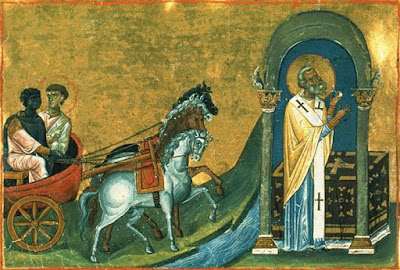 Immediately Philip sat beside him.
Immediately Philip sat beside him.
- "Who is the prophet talking about? Himself or someone else?" the Ethiopian asked.
- "He is talking about Jesus Christ, the savior of the world."
Philip started narrating the story of Jesus; His birth, His teaching, His miracles, His crucifixion, His resurrection, His ascension to heaven and the Pentecost. He explained the prophecies. He also recounted the events in Jerusalem a few days before. It was like the Ethiopian had read the whole Holy Scripture, the Old and the New Testament in a few hours. What a journey! What a great gift had God sent to him! The eyes of his soul were enlightened! His heart leapt with joy when he heard that whoever gets baptized in the name of the Holy Trinity becomes God's child.
- "There is water here!", he pointed to the small river which they were passing by. "What prevents me from getting baptized?"
- "Do you believe wholeheartedly?"
- "I believe that Jesus Christ is the Son of God!"
- "Then you can be baptized."
There, in the peace of the wilderness, where only the sound of the flowing river could be heard, Philip baptized the rich dignitary in the name of the Holy Trinity. There are no words to describe the Ethiopian's joy! As soon as the baptism was completed the Holy Spirit seized Philip and transferred him miraculously to another city named Azotus in order for him to preach the Gospel. The Ethiopian continued his journey. He was a new person now; the former heathen became the true God's child! This wondrous event is celebrated annually on the 27th of August.
The Holy Scripture is God's letter
God sent Philip to explain Isaiah’s words to the Ethiopian. But he also sends His people to us so as to explain His divine words; the priests and the preachers who teach the Gospel every Sunday during the orthodox liturgy. There is also the Sunday school, where the Gospel is explained to children and teenagers. All these are gifts from God so that we can learn about the divine truths.
The question that remains is whether we have the same desire as the Ethiopian. He longed to learn about God. He looked for and bought His book. He read it with interest and love. He couldn't help reading it every day. Although he wasn't able to understand everything, he sought the answers to his questions when he met a man of God. Do we feel the same longing?
Some people are like thirsty deer, which run to the wellspring and gulp the crystal-clear water. They try to learn more about God. Τhere are some children who wish like the Ethiopian to get this book. They keep it in their room, in their bookcase, on their desk or on a table beside their bed. They don't let a day pass without reading it. What's more, they ask Christian adults when they have questions or when they can't understand something.
Indeed, blessed are the children who love and read the Letter of God daily. They have a great progress in their life (see 1 Tim 4:16). Now I will narrate a true story of a little boy who was changed by the Holy Scripture. His name was Vasilis and he lived in a small village in Corinthia, Greece. He gave his new teacher a hard time at school. Everyone was always complaining about the little troublemaker. One day he snatched the ball of his classmates and ruined their game, at another time he smudged someone's notebook. He hit some children, he made fun of others, he swore... His parents didn't know how to handle the situation and his siblings were fed up with him.
Since the first month of the new school year, during the religious education lesson, the teacher talked to her class about the Holy Bible. Soon all her students bought a copy of the New Testament and started reading it eagerly. They even competed on who would manage to read it faster. Vasilis bought a copy, too. He read it carefully and he even could remember whole extracts by heart. He was the first to answer the teacher's questions on the subject. The more he was reading the more his behavior was changing. Before the end of that year everyone was talking proudly about “another” Vasilis. He didn’t swear anymore and he wasn’t naughty. He was amiable to everyone. His little sister wrote about him in her essay with the subject “My family’’: “I have a saint for a brother, Vasilis”.
Indeed, the letter of God has a unique power; to change our heart and attitude. There are plenty of good books that inform us. There are books which unfortunately deform us, meaning that they influence negatively our personality. The Holy Bible is the only book that can transform us. In other words, it helps us develop our virtues and correct our flaws. A fearsome person can become a saint, like the coal which can turn into a diamond.
A good book informs,
a bad book deforms,
the Holy Bible transforms!
Copyright © 2021 by Orthodox Christian Association «ΧΡΙΣΤΙΑΝΙΚΗ ΕΛΠΙΣ» ΟΡΘΟΔΟΞΗ ΑΔΕΛΦΟΤΗΤΑ. All rights reserved.
REJOICE, THROUGH WHOM JOY SHALL SHINE FORTH!
Translation from the book:
Στεργίου Ν. Σάκκου, «Ὦ πανύμνητε Μῆτερ!», ἐκδ. «ΧΡΙΣΤΙΑΝΙΚΗ ΕΛΠΙΣ» ΟΡΘΟΔΟΞΗ ΑΔΕΛΦΟΤΗΤΑ, Θεσ/νίκη 2010, σσ. 35-45 (Stergios N. Sakkos [Read CV], "You, all-laudable Mother", pp. 35-45)
Joy is a great and vital theme in our life. Man was created to live in the joy of paradise and he actually experienced it in his communion with God. But disobedience to God’s will, sin, took him out of paradise. So, ever since he lived with the great poverty caused by the lack of joy. But he did not stop looking for it wherever he suspected that he could find even a trace of it, a drop of joy. Man could be described as a "beggar of joy and a hunter of truth" or "a beggar and hunter of true joy".
Of course, the Lord, in his Sermon on the Mount, blesses those who mourn (Mt 5:4) and the Lord’s brother James exhorts: “Change your laughter to mourning and your joy to gloom.” (Jas 4:9). Also, our Church always and especially during the period of Lent, strongly emphasizes mourning, repentance, deep distress for our sins. Perhaps this caused a misunderstanding: that Christians have nothing to do with joy but only with mourning. Some even equate Christianity with gloom. They claim that the Gospel opposes to joy, that it supposedly does not allow Christians to laugh and rejoice.
All this is said by those who do not know our Christian faith and they ignore the Bible. If they had read the book of Psalms even once, they would have found out how often it refers to joy, and in fact to complete, perfect joy. Perfect joy is both an internal and external state. It springs from the depths of the heart and is expressed in a variety of ways: “A happy heart makes the face cheerful” we read in the God-inspired Proverbs (Prov 15:13). Few of the many references from the book of Psalms will be cited here: “Therefore my heart is glad, and my tongue rejoices” (Ps 15:9 [16:9]). “I will be glad and rejoice in thy mercy” (Ps 30:8 [31:7]). “O let the nations be glad and sing for joy” (Ps 66:5 [67:4]).
We must remember that there are two "joys": the true and the false; the joy of the Church and the joy of the world; the joy of Christ and the joy of Satan; the joy of purity and holiness and the joy of debauchery and prodigality. Our Lord has made things clear. He gave us the attributes of true joy, of His own joy.
And what is Christ’s joy? How does it stand out from the joy of the world? Christ’s joy has two basic features: permanence, " no one will take away your joy" (Jn 16:22), and fullness, " I say these things while I am still in the world, so that they may have the full measure of my joy within them" (Jn 17:13; cf. 15:11). That is why the apostle Paul urges the faithful: " Rejoice in the Lord always. I will say it again: Rejoice!" (Phil 4:4; cf. 1 Thess 5:16).
Jesus Christ in the famous farewell speech to his disciples, after the Last Supper, reveals that God is triune. It is very interesting that in that same speech (see Jn 13-16) the Lord presents another holy trinity, which has to do with our spirituality, with our sanctification. He speaks of love, peace and joy, which in fact He distinguishes from those of the world; He refers to His own love, to His own peace, to His own joy; “Very truly I tell you, you will weep and mourn while the world rejoices. You will grieve, but your grief will turn to joy.” (Jn 16:20).
These three great and important gifts that Christ gives to his disciples, namely love, joy and peace, which are connected with the Last Supper, are recorded by the apostle Paul as the first three fruits of the Holy Spirit. “But the fruit of the Spirit is love, joy, peace” (Gal 5:22). What an amazing combination! How much it reveals and teaches us! Consequently, in order to have Christ’s love, to enjoy true peace, permanent and complete joy, we need the Holy Spirit. Only by the Holy Spirit do we obtain these great things, because these are His fruits.
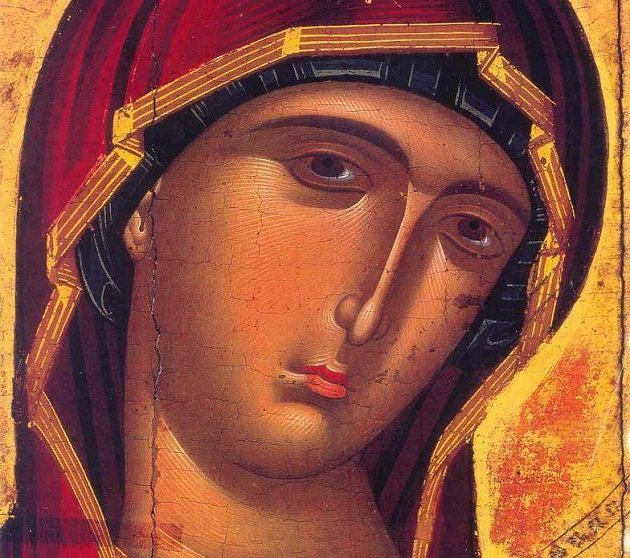 That is why virgin Mary radiates with joy! She is the one who received in her life the visitation of the Holy Spirit in a unique way, as the angel foretold her: “The Holy Spirit will come upon you, and the power of the Highest will overshadow you” (Luke 1:35). With the Holy Spirit, the humble girl of Nazareth conceived the fruit of life, our Lord Jesus Christ, the Redeemer, the donor of true and so the complete and inalienable joy. Thus, how can she not shine like the sun? She radiates her Son’s radiance. This is how the evangelist John saw her, as he writes in Revelation: "a woman clothed with the sun" (Rev 12:1). This is how she has been experienced by the Church in the first Stasis (A) of the Akathist Hymn, in the first Salutation that greets her with this verse: “Rejoice, through whom joy shall shine forth; Rejoice, through whom the curse shall vanish.”
That is why virgin Mary radiates with joy! She is the one who received in her life the visitation of the Holy Spirit in a unique way, as the angel foretold her: “The Holy Spirit will come upon you, and the power of the Highest will overshadow you” (Luke 1:35). With the Holy Spirit, the humble girl of Nazareth conceived the fruit of life, our Lord Jesus Christ, the Redeemer, the donor of true and so the complete and inalienable joy. Thus, how can she not shine like the sun? She radiates her Son’s radiance. This is how the evangelist John saw her, as he writes in Revelation: "a woman clothed with the sun" (Rev 12:1). This is how she has been experienced by the Church in the first Stasis (A) of the Akathist Hymn, in the first Salutation that greets her with this verse: “Rejoice, through whom joy shall shine forth; Rejoice, through whom the curse shall vanish.”
Do you want, then, to see joy not depicted in a painting, nor imprinted in a poem, but embodied in a person? Worship virgin Mary with reverence. She is the inexhaustible source of joy and the model of true joy. In the Small Supplicatory Canon (Small Paraklesis) we chant: " With gladness fill my heart, Most Holy virgin Lady, for you are she who received the abundant joy". Those who want to study joy, those who want to acquire joy, those who want to keep joy, those who want to rejoice, those who want to sing and praise the incarnated joy, let kneel before the blessed and highly favored Maria. In her virgin person they will meet joy at the highest and perfect degree.
"Your birth, O virgin Mother of God, proclaims joy to the whole world, for from you arose the Sun of Righteousness, Christ our God;” we sing on the feast of the Nativity of the blessed virgin Mary. She is the one who gave birth to the source of true joy, the sun of righteousness. Her completely special and unique relationship with Jesus Christ made her a spiritual sun, which radiates joy to all, young and old; to the happy she increases their joy and to the sad ones she dissolves their sorrow. She did not cease to radiate joy even during her hard hours of pain, when she saw her Son naked, humiliated, wounded, hung on the cross; when a sword pierced through her soul, just as Simeon had prophesied (see Luke 2:35). In those moments when the pain pierced her soul, no other mother has ever experienced a pain greater than this one, the virgin Mary patiently endured. The Holy Spirit from within comforted and guided her, so that she could interpret the Lord’s Passion, to see in it the redemption of the human race. This is wonderfully expressed by many Theotokia and in fact Stavrotheotokia, which are chanted in the Services of Wednesday and Friday.
The value of a good and ripe fruit becomes obvious when we place it near a rotten or an unripe one. Genuine currency is better valued when compared to counterfeit currency. Similarly, the joy of our Most Holy Lady, the most favoured and obedient God’s servant, who co-operated in the mystery of our salvation, shines more dazzlingly when we compare it with the situation in which our race was led by Eve’s disobedience. This is what the second verse points out: “Rejoice, through whom the curse shall vanish.”
Our Most Holy Lady incarnates, expresses and gives to all of us the greatest, the strongest joy, because she played a unique role in the world history. She became God's partner in the fulfillment of the First Gospel=First Good News (see Ge 3:15)
• to crush the devil,
• to get rid of the "curse" of sin which Eve's disobedience brought us,
• and to lead us to salvation.
And while the ancestor of our race, Eve, by disobeying God’s will caused a curse on us, the virgin Mary with her free submission to God’s call brought the antidote to that first curse, redemption into the world and offered to all of us joy.
Of course, the Redeemer of mankind, the only and irreplaceable one, is Jesus Christ. The apostle Paul writes it simply and clearly in his Epistle to the Galatians; "Christ has redeemed us from the curse of the law, being made a curse for us" (Gal. 3:13) and our Church chants with gratitude in the “Kathisma” of Holy Thursday: “You have redeemed us from the curse of the law by Your precious Blood. Having been nailed to the Cross and pierced with a spear, You have poured forth immortality upon mankind. O our Savior, glory to You.” His Most Holy Mother is raised and honored for her special and unique relationship with the Redeemer. The Word of God took her own blood to become man and it is this blood that He shed on the cross for our redemption!
Our life can be characterized as a “valley of tears”. It is intertwined with sorrows and tears! And yet Christians, by believing in the Lord the Savior and through the intercessions of Ηis Most Holy Mother, can experience the exhortation of the apostle James; “My brethren, count it all joy when you fall into various temptations” (Jas 1:2). They can rejoice with the apostle Paul, who in his adventures and sufferings never lost his joy; “Now I rejoice in what I am suffering for you” is what he writes to the Colossians (1:24) from the prison of Rome. From there he also wrote the famous Epistle to the Philippians, also known as the Epistle of Joy.
This does not mean that Christians remain insensitive to grief and various forms of pain. Anything but that! However, they live a mystery; even in pain they retain Christ’s joy. The joy of the world proves many times to be sad and its pleasure painful. On the contrary, in our Christian faith sorrow becomes joy, pain turns into sweet pleasure! Even the greatest suffering, which is caused by sin, which is the root and cause of all the pains in our lives, is neutralized in faith, because Jesus Christ’s redemptive blood "cleanses us from all sin" (1 Jn 1:7). With sincere repentance and confession of our sins, with a conscious sacramental life, we get rid of the burden of sin and live that peculiar kind of joy, which the holy Orthodox Fathers call " joyful sorrow".
When somebody experiences reconciliation with God, then all other burdens, all sufferings and problems, no matter how serious they may be, cannot take Christ’s joy away from them. These are his cross, through which he will be led to the resurrection. Our Church declares it “for behold through the Cross, joy has come in all the world”. In addition, our Jesus Christ said that the joy of his faithful is complete and no one can take it away. It cannot be taken away even by disease, slanders, persecutions and hardships, not even when the world defames us; even when our dearest friends betray and abandon us and turn into deadly enemies, not even by death! (see Rom 8:35-39). No one and nothing can steal from us Christ’s joy, the virgin Mary’s joy, the true joy that sanctifies us, enlightens us and guides us to the eternal land of joy, to the Paradise of our Lord. There is where the virgin Mary with all the saints live, where we all long to go. May we, with her intercessions, be able to hear the Lord to say about us as well; “Well done, good and faithful servant … Enter into the joy of your lord.” (Mt 25:21.23).
Copyright © 2021 by Orthodox Christian Association «ΧΡΙΣΤΙΑΝΙΚΗ ΕΛΠΙΣ» ΟΡΘΟΔΟΞΗ ΑΔΕΛΦΟΤΗΤΑ. Used by permission. All rights reserved.
Cain and Abel
Translation from the Book
Ὁ Θεός στήν Παλαιά Διαθήκη, Βοήθημα Κατωτέρου Κατηχητικοῦ Α΄,
ἐκδ. «Χριστιανική Ἐλπίς» Ὀρθόδοξη Ἀδελφότητα, Θεσσαλονίκη 2015, σσ. 20-24
Genesis 4:1-15
In some churches above the Beautiful Gate there is a big painted eye to remind us of a great truth, that God can see everything. Like a caring father, who carefully watches where his child goes and what does, God who is our heavenly father, doesn’t take His eyes off us. He watches us with all His love all the time.
Cain, unfortunately, the first child of Adam and Eve, forgot this truth. If he had this in mind, he wouldn’t commit the terrible crime he did.
One day Cain, who was a farmer, wanted to offer a sacrifice to God. He took some of the fruits he had gathered from his fields and burned them on an altar. Abel, the second son of Adam and Eve, who was a shepherd, offered God a sacrifice, too. But he chose to sacrifice the best of his sheep.
God saw the gifts of Abel with much joy. But Ηe didn’t care about Cain’s gifts. God doesn’t need our gifts. What He wants from us is to offer Him our heart. Cain offered Him, a sacrifice, but not with his heart. On the contrary, Abel loved God with his whole heart. And God knew it. He is omniscient and knows what every single heart hides within. That's why he didn’t like Cain’s gifts but he gladly accepted Abel’s gifts.
Cain understood that God didn’t like his gifts and that made him very upset. But God spoke to him with fatherly love:
- Why are you so sad? Why do you look so gloomy? Isn’t it your fault that you chose and offered gifts with a cold heart? Now, don’t worry. You can correct your mistake if you want to.
Cain, however, put the blame on his brother, Abel, as if it were his fault. A thought was swirling in his mind: "Why God accepted Abel’s gifts and not mine?"
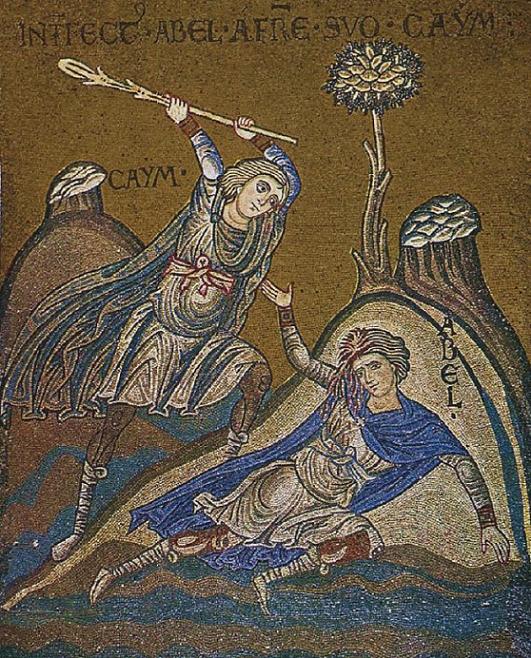 One day he asked Abel to take a walk together. The kind-hearted and innocent Abel walked joyfully next to his brother. There was nothing evil in his mind. Cain, however, when they went far away and he was sure that no one would see him, attacked Abel as a wild beast and killed him!
One day he asked Abel to take a walk together. The kind-hearted and innocent Abel walked joyfully next to his brother. There was nothing evil in his mind. Cain, however, when they went far away and he was sure that no one would see him, attacked Abel as a wild beast and killed him!
When he saw that his brother was dead, he was frightened. He didn't know what to do. He began to run in the wilderness to get away from his brother’s frozen body as fast as possible.
But he heard God’s voice asking him:
- Cain, where is your brother?
And what did Cain answer? Listen to his cheeky answer:
- How would I know? Am I the guardian of my brother?
He wanted to hide his crime from God! Cain thought he was alone in the wilderness when he did his terrible act. He was wrong! He thought that no one saw it because no one was around. He was wrong! Cain forgot that Someone is always and everywhere present.
God’s voice was now stricter to the murderer:
- What have you done, Cain? Your brother΄s body cries out to me from the ground! From now on you will be cursed by the land that received your brother's blood! You will work on it and it will no longer yield its crops for you! In your entire life you will tremble and groan!
God said these words to the murderer with pain because He never stopped loving him. God loves all of us and He wants our salvation and our happiness. When He saw Cain trembling from the fear of being killed for the murder he committed, He promised him that He wouldn’t let anyone hurt him.
Even if Cain was no longer afraid of being killed, he spent his entire life full of guilt and remorse. The suffering face of the innocent Abel was continuously haunting him.
Under God’s gaze
Cain could never imagine how tyrannical his life would become after his brother’s murder! Alone in the wilderness, in a single moment, he committed the terrible crime that made him miserable for the rest of his life!
Was he alone in the wilderness? Yes, no man saw him. However, God saw him! If Cain had in mind this great truth, that God watches him, he wouldn’t commit this crime. "God watches me!" this thought would save him from the horrible sin.
We should have this thought in mind too and it will prevent us from many mistakes. How can I do this evil before His eyes? How can I watch dirty videos on the television or the internet? How can I take something that is not mine or make sinful actions under the gaze of my God?
Words, actions, thoughts ... Remember some of them: in the schoolyard with some schoolmates ... or in the isolated corner of the neighborhood with some friends... in the house with brothers or sisters... or during the night alone in front of the computer...
The only thing that can save our five senses from sin, is our God’s sweet presence. If I see, hear, speak, think together with God, everything I do will be just and proper. I won't have guilt or remorse. I will have God’s grace! God bestows His grace upon all the people who are trying to stay away from what makes Him sad, from what stains their souls.
Have you ever thought to spend your day like this? Then start with this thought: God watches me! Remind yourself this great truth all day long: I constantly live under my heavenly Father’s watchful eye! Try it and then all your life will be beautiful.
Copyright © 2021 by Orthodox Christian Association «ΧΡΙΣΤΙΑΝΙΚΗ ΕΛΠΙΣ» ΟΡΘΟΔΟΞΗ ΑΔΕΛΦΟΤΗΤΑ. All rights reserved.
Οἱ ἐμφανίσεις τοῦ Ἀναστημένου
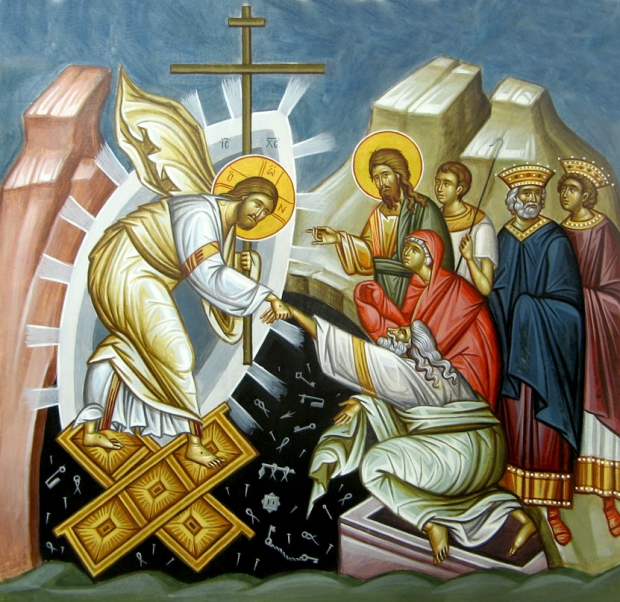 Ἄς ἐξετάσουμε αὐτές τίς ἴδιες τίς μαρτυρίες τῆς ἀναστάσεως τοῦ Χριστοῦ. Καταρχήν θέλω νά τονίσω ὅτι πουθενά στήν Καινή Διαθήκη δέν γίνεται περιγραφή τῆς Ἀναστάσεως, γιά τόν ἁπλούστατο λόγο ὅτι κανείς δέν εἶδε πῶς ἔγινε ἡ Ἀνάσταση. Κάποιο «Κατά Πέτρον εὐαγγέλιον», πού ἐπιχειρεῖ ἐξιστόρηση τοῦ γεγονότος τῆς Ἀναστάσεως, ὄχι μόνο δέν τό συμπεριέλαβε ἡ Ἐκκλησία στόν κανόνα τῆς Καινῆς Διαθήκης ἀλλά καί τό στιγμάτισε ὡς ἀπόκρυφο.
Ἄς ἐξετάσουμε αὐτές τίς ἴδιες τίς μαρτυρίες τῆς ἀναστάσεως τοῦ Χριστοῦ. Καταρχήν θέλω νά τονίσω ὅτι πουθενά στήν Καινή Διαθήκη δέν γίνεται περιγραφή τῆς Ἀναστάσεως, γιά τόν ἁπλούστατο λόγο ὅτι κανείς δέν εἶδε πῶς ἔγινε ἡ Ἀνάσταση. Κάποιο «Κατά Πέτρον εὐαγγέλιον», πού ἐπιχειρεῖ ἐξιστόρηση τοῦ γεγονότος τῆς Ἀναστάσεως, ὄχι μόνο δέν τό συμπεριέλαβε ἡ Ἐκκλησία στόν κανόνα τῆς Καινῆς Διαθήκης ἀλλά καί τό στιγμάτισε ὡς ἀπόκρυφο.
Μά τότε, ποιός μᾶς βεβαιώνει γιά τήν ἀνάσταση τοῦ Χριστοῦ; Ἐκεῖνοι πού εἶδαν τόν ἀναστημένο Κύριο. Οἱ ἐμφανίσεις τοῦ Ἀναστημένου, κατά τήν ἔκφραση τοῦ ἁγίου Χρυσοστόμου, εἶναι ἡ «διά πραγμάτων ἀπόδειξις τῆς Ἀναστάσεως». Σημειωτέον ὅτι κανείς ἀπό τούς μάρτυρες τῆς Ἀναστάσεως δέν πίστεψε ὅτι ἀναστήθηκε ὁ Χριστός πρίν τόν δεῖ αὐτοπροσώπως, ἀκόμη κι ἄν πρόσωπα δικά του τόν βεβαίωναν ὅτι τόν εἶδαν ἀναστημένο· καί κανείς ἀπό τήν στιγμή πού τόν εἶδε αὐτοπροσώπως δέν ἀμφέβαλε ποτέ ὅτι ὁ Χριστός ἀναστήθηκε. Ἡ Μαρία ἡ Μαγδαληνή, π.χ., καί οἱ ἄλλες μυροφόρες πῆραν ρητή πληροφορία ἀπό τούς ἀγγέλους ὅτι ὁ Χριστός ἀναστήθηκε, ἀλλά δέν πίστεψαν· πίστεψαν ὅταν τόν εἶδαν προσωπικά. Οἱ μαθητές πληροφορήθηκαν ἀπό τίς γυναῖκες ὅτι ἀναστήθηκε, ἀλλά δέν πίστεψαν παρά μόνον, ὅταν ὁ καθένας τους εἶδε μέ τά μάτια του τόν ἀναστημένο Χριστό.
Τέλος, εἶναι ἰδιαίτερα ἀξιοπρόσεκτο τό γεγονός ὅτι οἱ ἐμφανίσεις τοῦ ἀναστημένου Κυρίου περιγράφονται μέ χαρακτηριστική ἁπλότητα καί ἀφέλεια, στήν ὁποία διαφαίνεται ἡ εἰλικρίνειά τους. Μία παραβολή τῶν εὐαγγελικῶν διηγήσεων μέ τίς διηγήσεις καί περιγραφές πού περιέχουν τά ἀπόκρυφα ἀρκεῖ γιά νά δείξει τήν ἀσύγκριτη ὑπεροχή τῶν πρώτων. Ἀπου-σιάζει καθετί τό ἐξεζητημένο καί φαντασμαγορικό, ἐνῶ ἀντίθετα τά στοιχεῖα αὐτά κυριαρχοῦν στά ἀπόκρυφα.
Ποιοί τόν εἶδαν
Δώδεκα ἐμφανίσεις τοῦ Ἀναστημένου ἀναφέρονται στήν Καινή Διαθήκη. Τόν εἶδαν:
✿ ἡ Μαρία ἡ Μαγδαληνή (Μρ 16,9-11· Ἰω 20,11-18)
✿ οἱ μυροφόρες γυναῖκες (Μθ 28,9-10)
✿ οἱ δύο μαθητές πού πήγαιναν πρός Ἐμμαούς (Μρ 16,12-13· Λκ 24,13-32)
✿ ὁ Πέτρος (Λκ 24,34· Α΄ Κο 15,4)
✿ οἱ δέκα μαθητές (Λκ 24,36-43· Ἰω 20,19-25)
✿ οἱ ἕνδεκα μαθητές (Μρ 16,14· Ἰω 20,26-29)
✿ οἱ ἑπτά μαθητές στήν Τιβεριάδα (Ἰω 21,1-23)
✿ οἱ μαθητές στό ὄρος (Μθ 28,16-20)
✿ οἱ πεντακόσιοι μαθητές (Α΄ Κο 15,6)
✿ ὁ ἀδελφόθεος Ἰάκωβος (Α΄ Κο 15,7)
✿ οἱ μαθητές στήν Βηθανία, κατά τήν Ἀνάληψη (Λκ 24,50-53· Πρξ 1,2-12)
✿ ὁ ἀπ. Παῦλος (Α΄ Κο 15,8).
Ἀλλ᾿ αὐτές εἶναι μερικές μόνο ἀπό τίς πολλές ἐμφανίσεις τοῦ Κυρίου, διότι, ὅπως σημειώνουν οἱ Πράξεις, «παρέστησεν ἑαυτόν ζῶντα... δι᾿ ἡμε-ρῶν τεσσαράκοντα ὀπτανόμενος αὐτοῖς» (Πρξ 1,3).
Πόσοι τόν εἶδαν
Ὁ ἀναστημένος Κύριος ἐμφανίσθηκε σέ:
♦ ἕνα ἄτομο
♦ δύο
♦ τρία-τέσσερα
♦ ἑπτά
♦ δέκα
♦ ἕνδεκα
♦ ἑβδομήντα
♦ ἑκατόν εἴκοσι
♦ πεντακόσια,
ἦταν δέ ἄτομα καί τῶν δύο φύλων.
Πότε τόν εἶδαν
Ἐμφανίσθηκε:
✤ πρωί
✤ μεσημέρι
✤ δειλινό
✤ ποτέ νύχτα, γιά νά μή θεωρηθεῖ ὄνειρο.
Ποῦ τόν εἶδαν
Οἱ μαθητές εἶδαν τόν ἀναστημένο Κύριο σέ διάφορα μέρη:
✣ κοντά στόν τάφο
✣ στόν δρόμο
✣ στόν γιαλό
✣ σέ σπίτι
✣ σέ βουνό
✣ σέ πόλη
✣ σέ ὕπαιθρο
✣ στήν Ἰουδαία - Ἰεροσόλυμα
✣ στήν Γαλιλαία.
Πῶς τόν εἶδαν
Ἡ παρουσία τοῦ ἀναστημένου Ἰησοῦ δέν ἦταν μία φευγαλέα ὀπτασία. Πολλές ἀπό τίς ἐμφανίσεις κράτησαν ὧρες ὁλόκληρες.
✿ Τόν ἀντιλήφθηκαν μέ ὅλες τίς αἰσθήσεις τους οἱ παριστάμενοι. Ὁ Ἰωάννης μαρτυρεῖ· «ὅ ἑωράκαμεν τοῖς ὀφθαλμοῖς ἡμῶν, ὅ ἐθεασάμεθα καί αἱ χεῖρες ἡμῶν ἐψηλάφησαν... ἀπαγγέλλομεν» (Α΄ Ἰω 1,1-2).
✿ Τόν εἶδαν.
✿ Τόν ἄκουσαν νά μιλᾶ καί μάλιστα νά τούς ἐξηγεῖ πράγματα πού μέχρι τότε δέν καταλάβαιναν.
✿ Τόν ἄγγιξαν.
✿ Τοῦ ἔδωσαν κι ἔφαγε μαζί τους. Ἦταν «συναλιζόμενος αὐτοῖς» (Πρξ 1,4), σημειώνει ὁ Λουκᾶς. Ὁ Πέτρος καταθέτει· «συνεφάγομεν καί συνεπίομεν αὐτῷ μετά τό ἀναστῆναι αὐτόν ἐκ νεκρῶν» (Πρξ 10,41).
Ἀπό τό βιβλίο τοῦ Στεργίου Σάκκου, Ἀληθῶς ἀνέστη ὁ Κύριος, ἔκδ. 3η, Θεσ/νίκη 2007, σελ. 140-144
The Fall of Adam and Eve
Take a look at the world surrounding us. Is it as beautiful as God created it? No, nature often seems to be wild. Why does this happen, though? Let’s take a look at the events one by one.
God chose a very beautiful piece of land, a huge garden in the East, surrounded by four big rivers, in the region of Mesopotamia. He put the first people, Adam and Eve, to live there, in Paradise, in the garden of Eden. The scientists who have conducted research on this, located the traces of early human life, the first tribes and the first civilizations in Mesopotamia, in SW Asia. That is to say, as the Holy Bible informs us, where paradise was placed.
Adam and Eve, living inside the garden of EDEN, where innocent, like young children, and they were full of HAPPINESS. They had everything they wished for. There were all kinds of trees and fruits in this garden. However, this was not what filled them with joy. Do you know what made their happiness bloom? LOVE: they loved God very much and they could feel how much He loved them as well! They could meet Him every day and talk to Him, like children to their father. They enjoyed this MEETING very much!
God showed His love to humans in many ways – HE gave them immortal souls, made them the sovereigns of earth, blessed them with an abundance of goods and the pleasure of meeting Him. People, however, did not have any means of showing their love to Him. That’s why, God gave to Adam and Eve a COMMANDMENT: “You are allowed to eat from every tree in paradise, but not from the tree of the knowledge of good and evil, because as soon as you do, you will die”. In this way, by TRUSTING God and OBEYING His commandment, Adam and Eve could show Him their love and that they really wanted to stay with Him forever. The same goes for us as well. Every time we follow God’s commandments, we show Him our love.
When my love for God is deep,
His commandments I do keep!
Adam and Eve were really happy inside the garden. Someone, though, envied this HAPPINESS and wanted to destroy it. This “someone” is the enemy of every good thing, the devil, whose only wish is to separate people from God. One day, he approached Eve, taking the form of a serpent and talked to her in a human voice.
- Why does God forbid you to eat fruits from all the trees in the paradise?
- He does not forbid us to do that, replied Eve, we may eat the fruit from all of the trees in here. The only tree that He told us to neither touch nor eat from is the tree in the middle of the garden; because if we do, we will die.
- Oh no, you will not die, said the serpent. God knows that if you eat from this tree, your eyes will be opened and you will be like gods. You will know what is good and what is evil.
Eve, then, looked at the tree and for the first time it appeared quite beautiful to her and its fruits seemed very attractive. She stretched her arm and -alas!- she cut a fruit, ate it and gave it to Adam as well. What a tragic moment! They believed devil’s words, the enemy of God, the enemy of every good thing, and ignored God’s commandment, the one who showed them so much love!
From that moment on, they were no longer innocent. They started feeling shame and fear. Their soul was filled with darkness. They lost their happiness. Deep sorrow dominated their hearts since the first sin on earth was committed. Do you know what sin is?
Disobedience to God’s commandments is sin
and it brings along sadness and grief.
As the evening, the time when God would come to visit them, got closer and closer, Adam and Eve grew even more afraid. Ashamed of themselves, they found a place to hide. Sin had blacked out their minds so much, that they thought they could hide from the all-knowing God. In a short while, they heard His voice:
- Adam, where are you?
- I heard your steps as you were approaching and I hid myself, because I am naked, was Adam’s timid reply.
- Who told you that you are naked? asked God. Did you eat from the tree of the knowledge of good and evil?
God asked him that, not because He did not know, of course -since He knows everything-, but because He wanted to help Adam admit his mistake, his sin. However, Adam didn’t say: “Yes, my Lord, I did not follow what You asked, I did not do Your will, I am sorry”, instead, he started giving excuses: “The woman You gave me as a companion, gave me to eat.”.
God then, turned to Eve:
-Eve, why did you do that?
-The serpent deceived me, was her response.
Hearing all this, God got very sad, because Adam and Eve, who were so happy with Him, should separate from Him. They were cast out from Paradise. Away from God, they could no longer be immortal or happy as they were before. What awaited them was sorrow, pain and death. God told Eve that she would give birth to her children in pain, and Adam that he would have to work hard to earn his living.
Sin did in fact fill the world with MISERY. From that moment onwards, people got tired, felt pain, often shed TEARS. ACCIDENTS, ILLNESSES, DEATH, HYPOCRISY, WAR, CRISIS have occupied our world, along with wickedness. All these are misfortunes that appeared after the first sin. Even nature itself became wild. Earthquakes, floods and all sorts of natural disasters started occurring. None of those existed in Paradise before the fall of man.
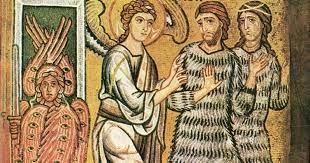 The gates of Paradise were closed. Forever? No! In that terrible and frightening moment, when there was no hope for Adam, Eve and their descendants, God conceived a plan of love to save them. He could not stand watching His children live in sorrow, even if they disregarded His commandment, so He made a promise to them. He would send Someone to free them from sin and return them to Paradise! This sweet promise that God made is called the first-gospel, which means “the first good news” and it reveals our God’s infinite love.
The gates of Paradise were closed. Forever? No! In that terrible and frightening moment, when there was no hope for Adam, Eve and their descendants, God conceived a plan of love to save them. He could not stand watching His children live in sorrow, even if they disregarded His commandment, so He made a promise to them. He would send Someone to free them from sin and return them to Paradise! This sweet promise that God made is called the first-gospel, which means “the first good news” and it reveals our God’s infinite love.
Did God keep His promise? He most definitely did. He sent His Son, our Lord Jesus Christ, in our world to save us. He was born from a distant descendant of Eve and Adam, the virgin Mary, the Most Holy Theotokos.
Paradise’s gates: doors shut,
were opened by Christ’s sacrificial love.
The First-Martyr Stephen
Translation from the Book
Ὁ Θεός στήν ἱστορία τῆς Ἐκκλησίας, Βοήθημα Κατωτέρου Κατηχητικοῦ Γ΄,
ἐκδ. «Χριστιανική Ἐλπίς» Ὀρθόδοξη Ἀδελφότητα, Θεσσαλονίκη 2016, σσ. 18-23
Acts chapters 6-7
The persons who belong to the same family look more or less like each other: in the eyes, in the colors, in the features of the face ... We can recognize the children especially if they look like their parents.
In the same way, we Christians, who are all one family with God our Father, must look like to our Father! Today I will tell you the story of a young man who managed to look like our Lord Jesus Christ. He lived in the first years of the Church, yet to this day all the faithful admire him and would like to imitate him.
Stephen, that was his name, believed and loved Christ with all his heart. He stood out among other Christians for his strong faith, but also for his wisdom. He was full of the enlightenment of the Holy Spirit. That is why he was chosen to be one of the seven deacons, that is, one of the seven helpers of the apostles. Tireless, Stephen cared for the widows, for the poor, for all those in need. In addition, he preached zealously for Christ. He even performed miracles with Jesus Christ’s power.
In Jerusalem the number of Christians increased more and more. This, however, angered Christ’s enemies. The Pharisees and the high Priests hated Stephen and envied him. One day at the synagogue, some people got up to talk to him. They tried to trap him with their words and questions. But in vain. They did not succeed. It was impossible for them to counter argue his wisdom. Stephen left them speechless. Humbled as they got, blinded by their envy and hatred they decided to pay men to lie that they had heard Stephen blaspheming Moses and God! So, they managed to turn the common people and the religious leaders against him! He was arrested and dragged to the Jewish council to stand trial. Indeed, a trial was held against him. Witnesses were presented. What did they claim against Stephen? They passionately accused him: "This man does not stop cursing our temple and the mosaic law!". But had they ever heard Stephen curse? Of course not! They were false witnesses; they were paid to lie. It was time for the accused to answer. They all turned their eyes to him. What a contrast! Those had dark looks but Stephen’s face shined with a heavenly beauty, he looked like an angel! Everyone was left stunned.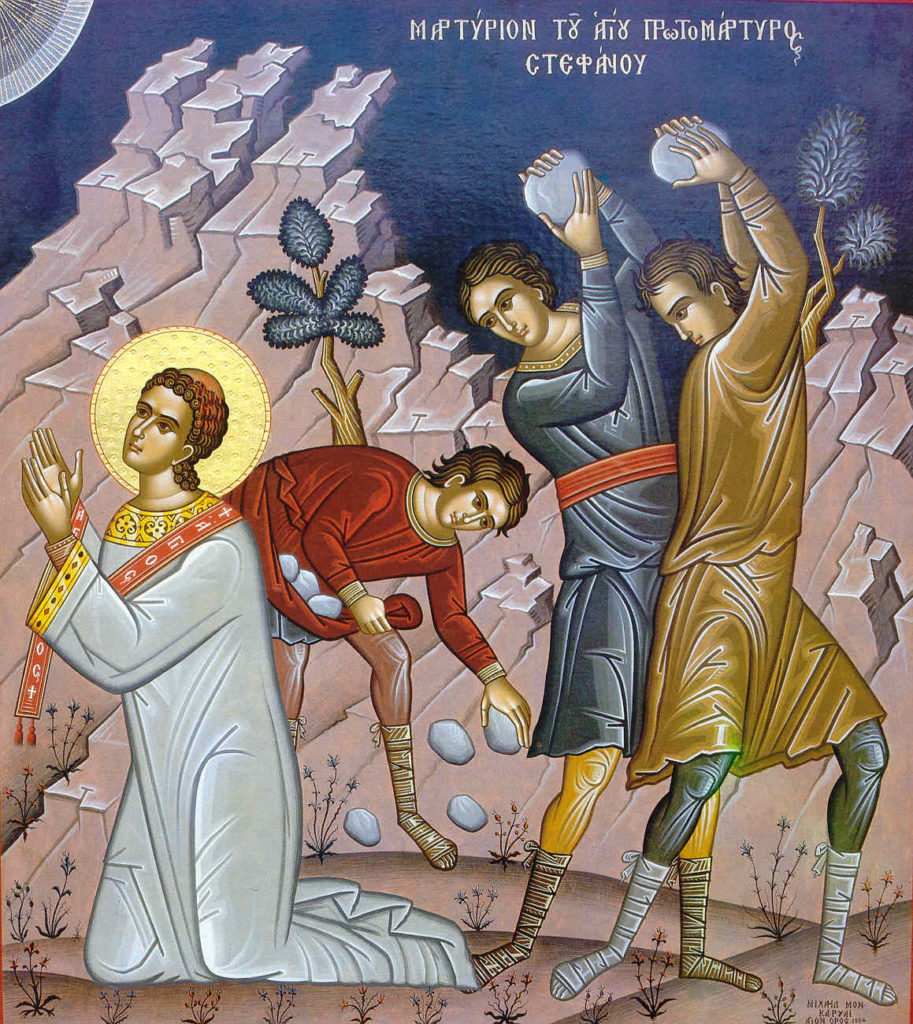 Stephen held the floor. He reminded the Jewish judges of the history of their people, starting with the patriarch Abraham. He talked about Moses and the temple of Solomon. So, he showed them that they had unjustly accused him of using blasphemous words. He ended his address with strict probing. He spoke to them with the language of truth: "You are the ones who crucified Jesus, you are always the ones going against the will of God!" While they were listening to him hatred pierced their hearts like a knife. They looked at him aggressively. How he dared to speak to them with such boldness! Stephen would pay them dearly for it! But God helped his faithful young man. He opened the sky. Stephen was filled with the Holy Spirit and he saw God’s glory and Jesus standing at the right hand of God the Father. "Behold," he said, "I see the heavens open and the Son of man, that is, Jesus Christ, standing at the right hand of God!" His enemies could no longer bear listening to him. They shouted at him with wild voices and pulled him out of the city. They started throwing stones at him mercilessly. They were determined to kill him. And how did Stephen answer? Did he respond with hatred? No! Stephen prayed: "Lord Jesus, receive my spirit!". While the stones were falling like rain on him, he knelt bloodied and exhausted and with a loud voice coming from the depths of his heart, he exclaimed: "Lord, do not hold this sin against them, forgive them!" As he finished his words full of love and forgiveness, his soul fluttered to heaven. He was the first to win the incorruptible crown of martyrdom. He is the first martyr of Christ. That is why he is called the first-martyr.
Stephen held the floor. He reminded the Jewish judges of the history of their people, starting with the patriarch Abraham. He talked about Moses and the temple of Solomon. So, he showed them that they had unjustly accused him of using blasphemous words. He ended his address with strict probing. He spoke to them with the language of truth: "You are the ones who crucified Jesus, you are always the ones going against the will of God!" While they were listening to him hatred pierced their hearts like a knife. They looked at him aggressively. How he dared to speak to them with such boldness! Stephen would pay them dearly for it! But God helped his faithful young man. He opened the sky. Stephen was filled with the Holy Spirit and he saw God’s glory and Jesus standing at the right hand of God the Father. "Behold," he said, "I see the heavens open and the Son of man, that is, Jesus Christ, standing at the right hand of God!" His enemies could no longer bear listening to him. They shouted at him with wild voices and pulled him out of the city. They started throwing stones at him mercilessly. They were determined to kill him. And how did Stephen answer? Did he respond with hatred? No! Stephen prayed: "Lord Jesus, receive my spirit!". While the stones were falling like rain on him, he knelt bloodied and exhausted and with a loud voice coming from the depths of his heart, he exclaimed: "Lord, do not hold this sin against them, forgive them!" As he finished his words full of love and forgiveness, his soul fluttered to heaven. He was the first to win the incorruptible crown of martyrdom. He is the first martyr of Christ. That is why he is called the first-martyr.
Forgiveness, the attribute of God’s children
How did young Stephen managed to look like our Lord Jesus Christ? As Christ on the Cross forgave and prayed for those who crucified him, Stephen forgave and prayed for those who stoned him. "Father, forgive them, for they know not what they do" (Lk 23:34). You may not have bitter enemies yet. Every day, however, you are given various opportunities to forgive. These are some cases when we need to forgive:
♦ When they make fun of us, sometimes even behind our backs, for something we may not be able to do or do not do so well or for some of the habits we still have or for our weaknesses and imperfections.
♦ When our classmates or people we consider our friends lie to us. How many times have we been disappointed, when we found out that those we trusted betrayed our friendship with a lie!
♦ When we are being slandered, that is, when they spread false rumors that we said or did something bad.
♦ When they curse us, they speak badly to us, they tell us words that hurt.
♦ When they hit us, they push us and want to throw us down, without us even provoking them.
Every day, we have reasons to forgive. But do we forgive? Our first reaction is to take our revenge: Did they fool us? Let’s fool them back. Did they hit us? Let's hit them back. Did they swear at us? Let’s swear at them back. That is easily done. That is why there are so few who manage to do the opposite, to forgive with their heart.
But it is so necessary to forgive! How can I say the "Our Father" if I do not forgive? Jesus Christ has taught us to say in this prayer "Forgive our sins, as we also forgive those who have wronged us." So, if we have not forgiven, how dare we say the "Our Father"? Christ also told us: "If you do not forgive others, then I will not forgive your sins" (see Mt 6:15). And we commit so many sins ... If we do not forgive the mistakes of others, our own sins will remain unforgivable!
But how will we be able to forgive? With Christ’s help we can make a difficult perhaps, yet a worthy struggle: We should not pay back the evil they did to us. On the contrary:
♦ Has anyone hurt me? I must find an opportunity to respond to him with kindness!
♦ Has he spoken insultingly to me? I’ll answer him with love!
♦ Has he talked badly about me? I’ll look for an opportunity to talk about him with praise!
♦ Has someone hurt me? I’ll make a prayer for him!
God, who is my father, raises His sun for both those who love Him but also for His enemies (see Mt 5:45). He grants to everyone, without exception, His goods. Therefore, if I want to be like Him, in order to be His true child, I have to do the same: to give to all, to friends and enemies, my love and my forgiveness! If I show love only to those who love me, if I do good only to those who treat me well, I do not do anything great (see Luke 6:32-33). However, by God’s power I can achieve something much greater: to show love to those who have done me harm! Every time we will achieve, by God’s grace, such a "great leap", we will experience the joy of the greatest victory! And in heaven the crown of glory will be prepared for us!
Copyright © 2021 by Orthodox Christian Association «ΧΡΙΣΤΙΑΝΙΚΗ ΕΛΠΙΣ» ΟΡΘΟΔΟΞΗ ΑΔΕΛΦΟΤΗΤΑ. All rights reserved.
